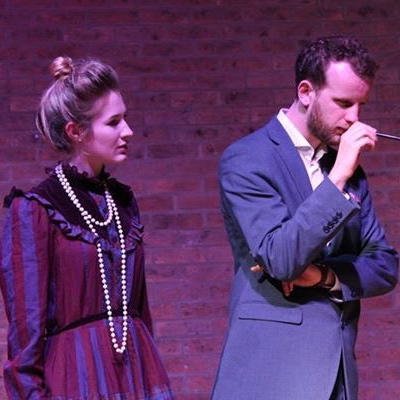- Richard Gill
- Darijan Božič
- Pierre Lacotte
- Iolanta
- Portuguese
- Grace Williams
- Rachel Holt
- Mary Louise Curtis Bok
Abundant Energy and Lively Imagination
MIKE WHEELER writes about Opera North's production of W S Gilbert and Arthur Sullivan's Savoy Opera 'Ruddigore'
To Inherit the title Baronet of Ruddigore is to be handed one hell of a poisoned chalice. Thanks to the sinister activities of the first baronet, and a resulting curse, you are condemned to commit a crime a day or die in agony. Gilbert and Sullivan's spoof melodrama-cum-gothic horror suffers from the usual problem - few of us these days are familiar enough with their targets to get the point. Add to that one of my nagging doubts about G & S productions: just how far can you ham it up, particularly in the spoken dialogue, without losing credibility? Too many, in my experience, cross that line, and Opera North's staging, the second of this season's revivals, didn't always avoid the pitfalls - Theatre Royal, Nottingham, UK, 21 November 2024.
But Jo Davies' original production, directed for this revival by James Hurley, brought plenty of fresh thinking to bear. The 1920s setting was heralded by the silent film-style captions filling us in on the back story during the overture. The spooky goings-on in Act II were particularly effective, with just enough thunder and lightning, and you really had to be there to marvel at the inventive way the portraits of previous generations of baronets came to life.
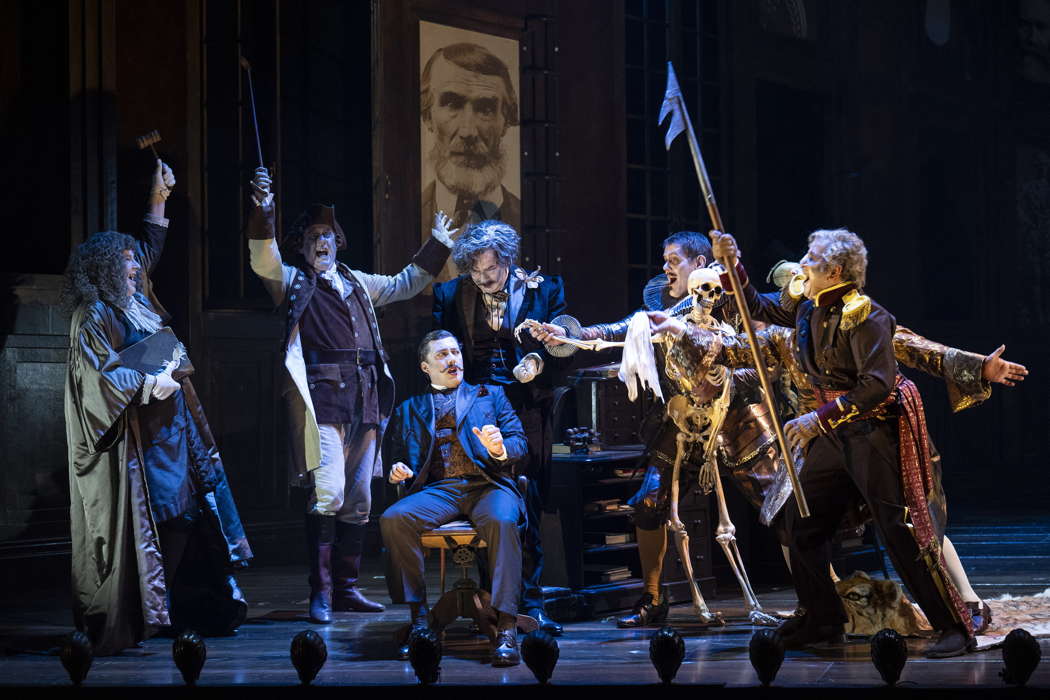
Dominic Sedgwick as Sir Ruthven Murgatroyd (seated) with members of the Chorus of Opera North as the ghosts of Ruddigore in Opera North's production of Gilbert & Sullivan's comic opera Ruddigore. Photo © 2024 Richard H Smith
Conductor Anthony Kraus kept the score on its toes, and there were no weak links in the singing, either solo or ensemble. John Savournin, who knows his way round the repertory as well as anyone, relished his pantomime-villain role as Sir Despard Murgatroyd, the current baronet (because older brother Ruthven, who should have inherited the title, ran away and changed his name to Robin Oakapple).
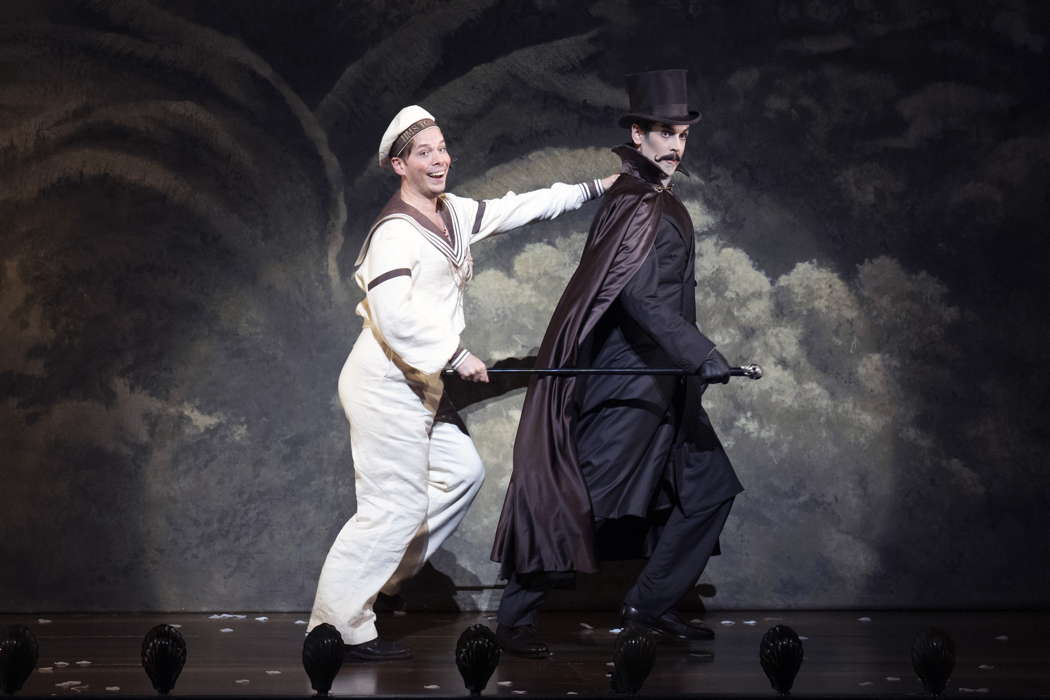
Xavier Hetherington as Richard Dauntless with John Savournin as Sir Despard Murgatroyd in Opera North's production of Gilbert & Sullivan's comic opera Ruddigore. Photo © 2024 Richard H Smith
Dominic Sedgwick's diffident Robin did his best to impersonate a wicked baronet in Act II, once his cover had been blown and he was forced to resume the title, but you knew from the start it was never going to work out. The third verse of his Act II song 'Henceforth all the crimes ...', replacing Gilbert's gibe at the politics of his day with a topical equivalent by Richard Stilgoe, 'Westminster bubble' references and all, was a neat touch.
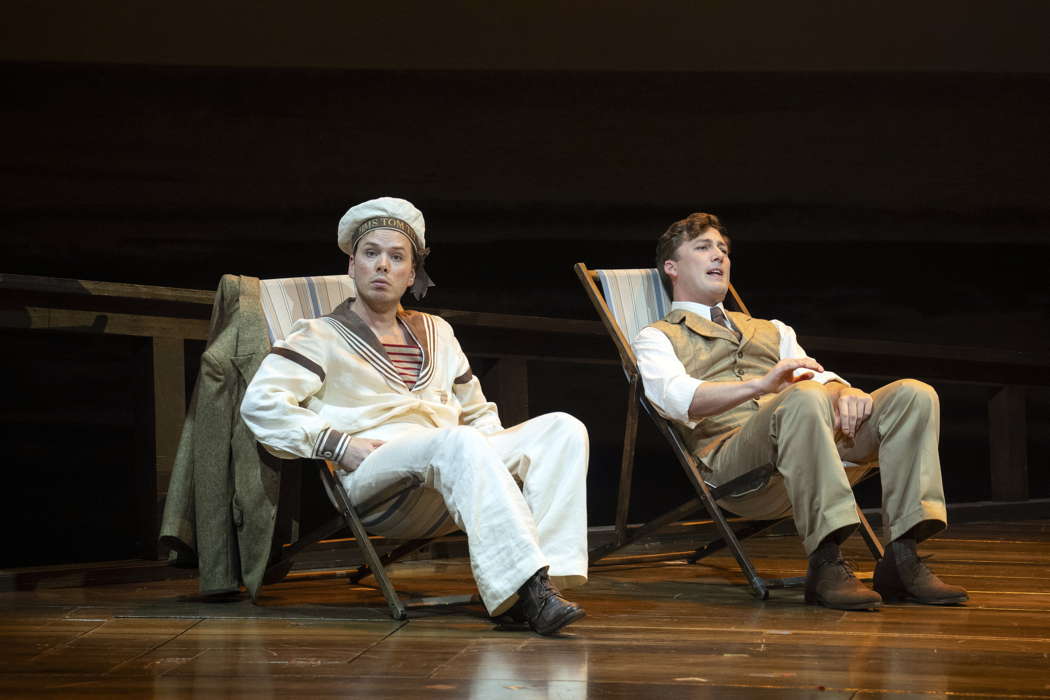
Xavier Hetherington as Richard Dauntless and Dominic Sedgwick as Robin Oakapple in Opera North's production of Gilbert & Sullivan's comic opera Ruddigore. Photo © 2024 Richard H Smith
Amy Freston returned to the role of Rose Maybud, both prim, governed by the rules of her etiquette book, and flirty, ready to switch potential partners at a moment's notice.
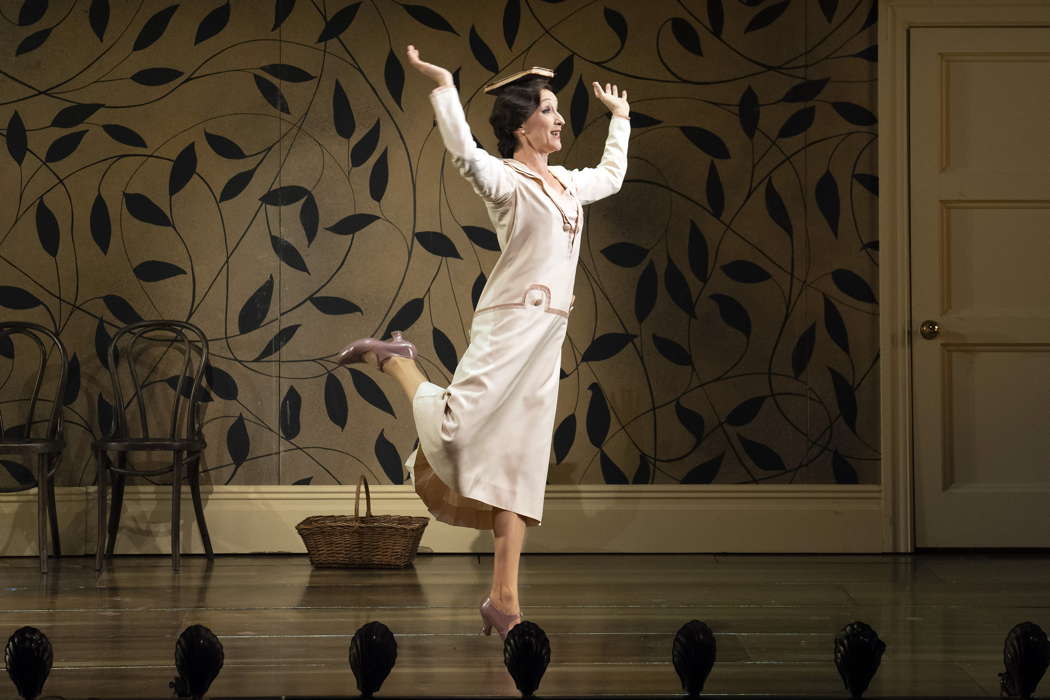
Amy Freston as Rose Maybud in Opera North's production of Gilbert & Sullivan's comic opera Ruddigore. Photo © 2024 Richard H Smith
Xavier Hetherington's bumptious Richard Dauntless, Robin's sailor foster-brother, home from sea, danced a nifty hornpipe.
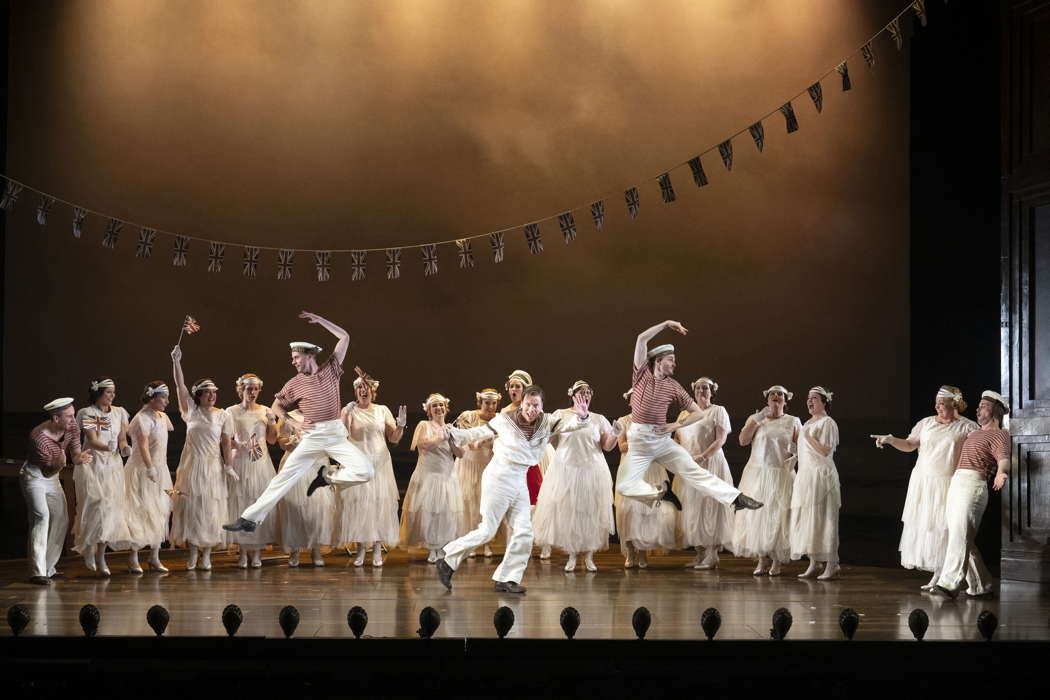
Xavier Hetherington as Richard Dauntless (centre) with dancers George Bishop (left), Ben Yorke-Griffiths (right) and members of the Chorus of Opera North in Opera North's production of Gilbert & Sullivan's comic opera Ruddigore.
Photo © 2024 Richard H Smith
Also resuming his former role, Henry Waddington gave Old Adam Goodheart, Robin's/Ruthven's servant, an unimpeachable sense of loyalty. Last time, his Act II costume and make-up suggested a member of the Addams Family; I missed that this time round.
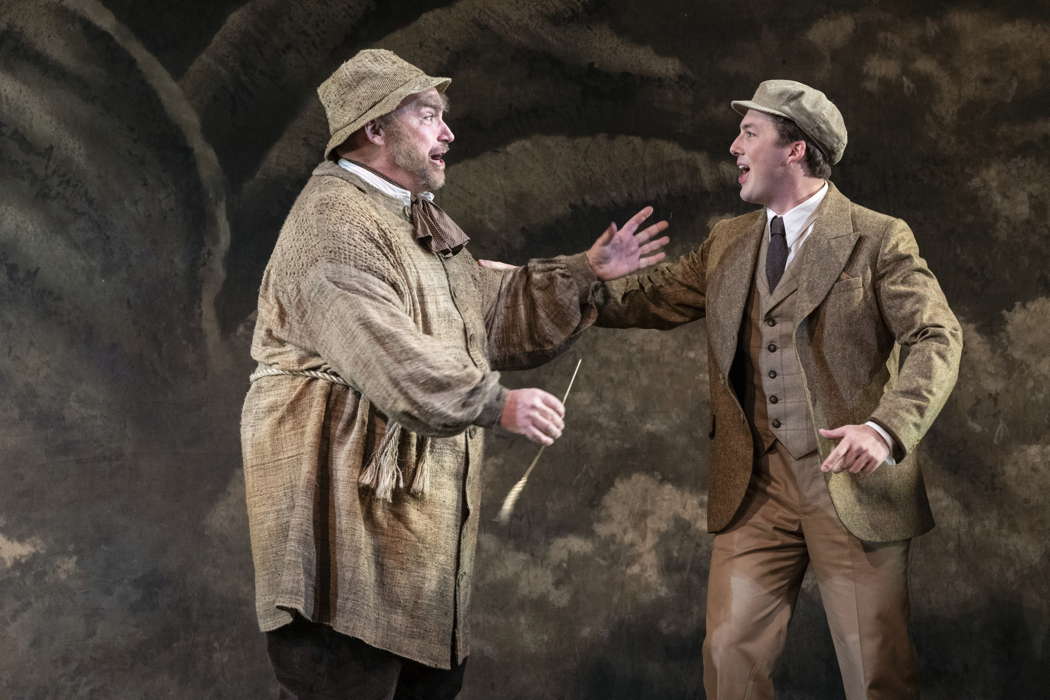
Henry Waddington as Old Adam Goodheart and Dominic Sedgwick as Robin Oakapple in Opera North's production of Gilbert & Sullivan's comic opera Ruddigore. Photo © 2024 Richard H Smith
Steven Page's Sir Roderic Murgatroyd, a World War I officer when alive, sternly cross-examined Robin/Ruthven on his compliance with the family curse, but was all tenderness when re-united with his old love, Dame Hannah - Claire Pascoe, well able to turn the tables on her captors after being abducted to Ruddigore Castle. Mad Margaret, Sir Despard's ex, is an awkward character - pitiable, or a figure of fun? Helen Évora did her best to resolve the ambivalence.
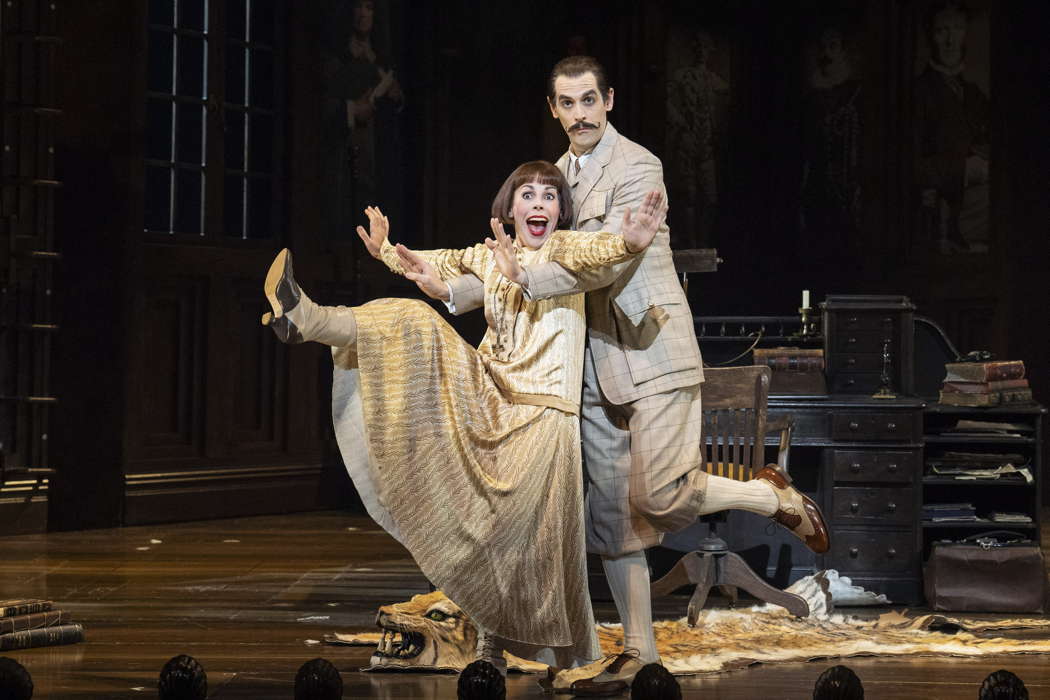
Helen Évora as Mad Margaret with John Savournin as Sir Despard Murgatroyd in Opera North's production of Gilbert & Sullivan's comic opera Ruddigore.
Photo © 2024 Richard H Smith
Gillene Butterfield was a dependable Zorah, one of the village's out-of-work troupe of professional bridesmaids, part of Opera North's ever-energetic chorus.
Richard Hudson's sets, Gabrielle Dalton's costume designs and Anna Watson's lighting gave the show plenty of visual interest, and Kay Shepherd's choreography had the right touch of tongue-in-cheek elegance.
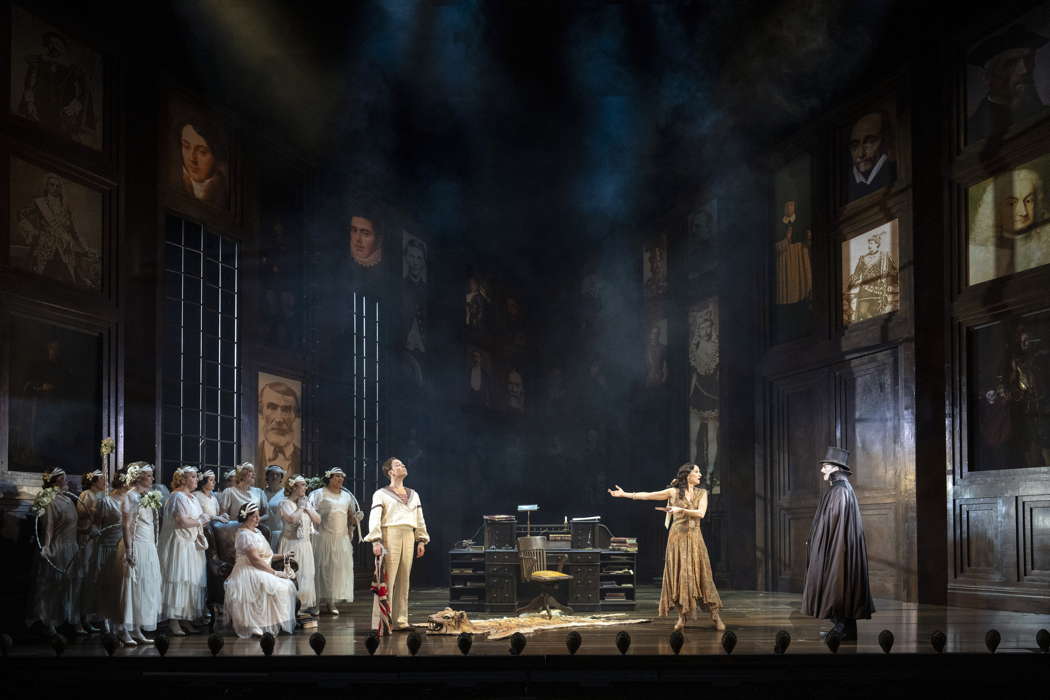
The ladies of the Chorus of Opera North with Xavier Hetherington as Richard Dauntless, Amy Freston as Rose Maybud and Dominic Sedgwick as Sir Ruthven Murgatroyd in Opera North's production of Gilbert & Sullivan's comic opera Ruddigore. Photo © 2024 Richard H Smith
So there it is. While the production didn't shake my on-going G & S scepticism, the cast's abundant energy and the lively imagination at work in the staging couldn't be faulted.
Copyright © 30 November 2024
Mike Wheeler,
Derby UK



